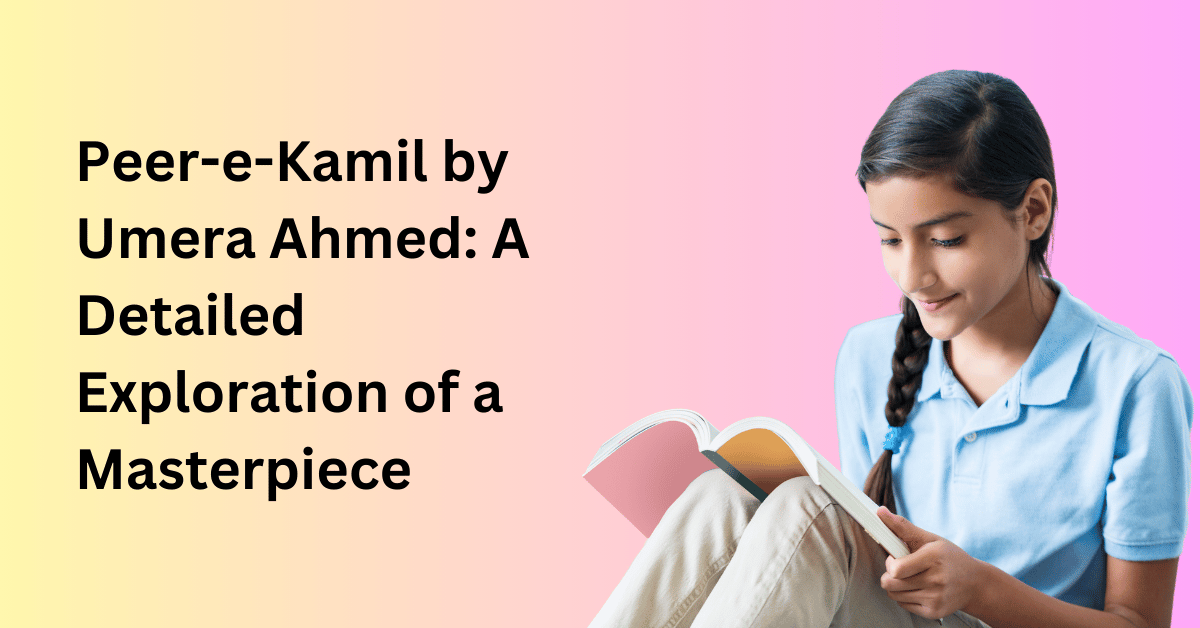Peer-e-Kamil by Umera Ahmed: A Detailed Exploration of a Masterpiece

Peer-e-Kamil by Umera Ahmed: An In-Depth Analysis of a Literary Masterpiece
The realm of Urdu literature is abundant with works that challenge societal norms, address existential questions, and elevate the human spirit. Among these notable pieces, Peer-e-Kamil by Umera Ahmed stands out, captivating the hearts of readers with its profound themes, complex characters, and an engaging plot that delves into the spiritual evolution of two souls. But what is it about this novel that makes it so impactful? Let’s take a closer look at its story, characters, and overall influence on readers.
Umera Ahmed: A Literary Powerhouse
Umera Ahmed is among Pakistan’s most celebrated contemporary writers, recognized for her distinctive storytelling that blends intricate religious and moral dilemmas with everyday realities. Her narratives often revolve around philosophical questions while remaining accessible to a broad readership. Peer-e-Kamil (translated as The Perfect Mentor) is widely regarded as her magnum opus, exploring the pursuit of spiritual fulfillment while contrasting materialism with faith.
The Importance of Peer-e-Kamil in Pakistani Literature
This novel is more than just a piece of fiction; it is a reflection on human existence, the search for deeper meaning, and the challenges one encounters when choosing a path of faith over conformity. Peer-e-Kamil has significantly influenced modern Urdu literature, inspiring readers to reassess their own lives and their spiritual journeys.
The Storyline of Peer-e-Kamil
At the center of Peer-e-Kamil are two protagonists: Imama Hashim, a woman trapped by her family’s strict beliefs, and Salar Sikander, a highly intelligent yet reckless young man devoid of purpose. Despite coming from different worlds, their lives intertwine in unexpected ways, leading them both on profound spiritual journeys.
Plot Summary
The novel opens with Imama, a medical student from an affluent yet conservative family. Secretly, she converts to mainstream Islam, which drives her to flee from an arranged marriage that her family imposes. On the other side, Salar is a privileged yet troubled young man with a genius-level IQ, whose life spirals into self-destructive behavior. Their paths intersect when Salar inadvertently aids Imama in her escape, setting off a series of events that force both characters to confront their deepest fears and desires, ultimately pushing them towards self-discovery and spiritual awakening.
Key Themes in Peer-e-Kamil
1. Spiritual Transformation
At its core, Peer-e-Kamil is about the spiritual awakening of two seemingly lost individuals. It delves into personal beliefs, the quest for truth, and the struggle to align one’s actions with a higher spiritual calling.
2. The Idea of the “Perfect Mentor”
The title refers to the concept of a perfect guide who helps individuals navigate the journey to spiritual enlightenment. In the novel, the mentor is not embodied by a single character but is instead represented through faith, life experiences, and transformative decisions.
3. Self-Discovery and Redemption
The character arcs of Imama and Salar are centered around intense self-discovery, ultimately leading to redemption. Salar’s transformation from a reckless youth to a spiritually enlightened individual is particularly poignant, illustrating that change is possible for anyone with determination and the right guidance.
Deep Dive into the Characters
Imama Hashim: A Woman’s Struggle for Freedom
Imama is portrayed as a strong and resilient character who courageously defies the constraints of her family and societal expectations. Her journey is a testament to the challenges faced by women who seek to break free from traditional norms in pursuit of personal and religious freedom.
Salar Sikander: From Rebellion to Spiritual Awakening
Salar’s character is one of the most compelling in the story. Initially depicted as arrogant and self-indulgent, his journey towards self-realization is marked by moments of profound introspection and change. Through a series of life-altering experiences, Salar’s character evolves, showing that even the most lost souls can find redemption.
Dr. Sibt-e-Ali: The Guiding Light
Dr. Sibt-e-Ali serves as a mentor figure, offering wisdom and spiritual guidance to Salar. His role exemplifies the novel’s central theme of finding a mentor to guide one towards a meaningful and righteous path.
Symbolism and Themes in Peer-e-Kamil
1. The Conflict Between Materialism and Faith
Salar initially embodies material success, yet it fails to bring him true happiness. In contrast, his later life, focused on spiritual pursuits, leads to inner peace, suggesting that fulfillment comes not from external achievements but from a deeper connection with faith.
2. The Significance of the Title
The phrase “Peer-e-Kamil” symbolizes the search for a perfect guide. The novel uses this metaphor to show that true mentorship comes from a combination of life experiences, faith, and personal reflection.
3. Water as a Symbol of Cleansing
Throughout the novel, water is used metaphorically to represent purification and renewal, reflecting the characters’ spiritual rebirth.
Umera Ahmed’s Writing Style
Umera Ahmed is known for her emotionally resonant storytelling. Her characters are richly developed, their struggles and transformations depicted with a depth that makes readers empathize with their journeys. The language in Peer-e-Kamil is both elegant and accessible, seamlessly blending philosophical insights with everyday dialogue, keeping readers engaged while prompting them to reflect on deeper questions.
The Impact of Peer-e-Kamil on Readers
Personal Reflections and Transformations
Peer-e-Kamil has profoundly affected its readers, inspiring them to reflect on their own lives and spiritual beliefs. Many have found themselves reconsidering their priorities and seeking a deeper connection with their faith after reading the novel.
Popular Reception and Influence
Since its release, Peer-e-Kamil has gained immense popularity not just in Pakistan but also among Urdu-speaking audiences worldwide. The novel’s exploration of spirituality, redemption, and self-discovery has made it a favorite among readers of all ages.
Addressing Criticisms
While Peer-e-Kamil has been widely praised, it has also faced criticism for its portrayal of religious themes and certain societal groups. Some argue that the novel’s take on spirituality is overly idealistic, while others believe its depiction of sectarian issues could be seen as controversial. Nonetheless, it remains a highly regarded work in modern Urdu literature.
Conclusion
Peer-e-Kamil is not just a story; it is a spiritual journey that challenges readers to look beyond the surface of their lives and seek a deeper connection with their inner selves. Umera Ahmed’s masterful storytelling, deep characterizations, and exploration of profound themes make this novel timeless. It continues to inspire readers to pursue faith, personal growth, and redemption, serving as a reminder that no matter how lost one may feel, there is always hope for change.






